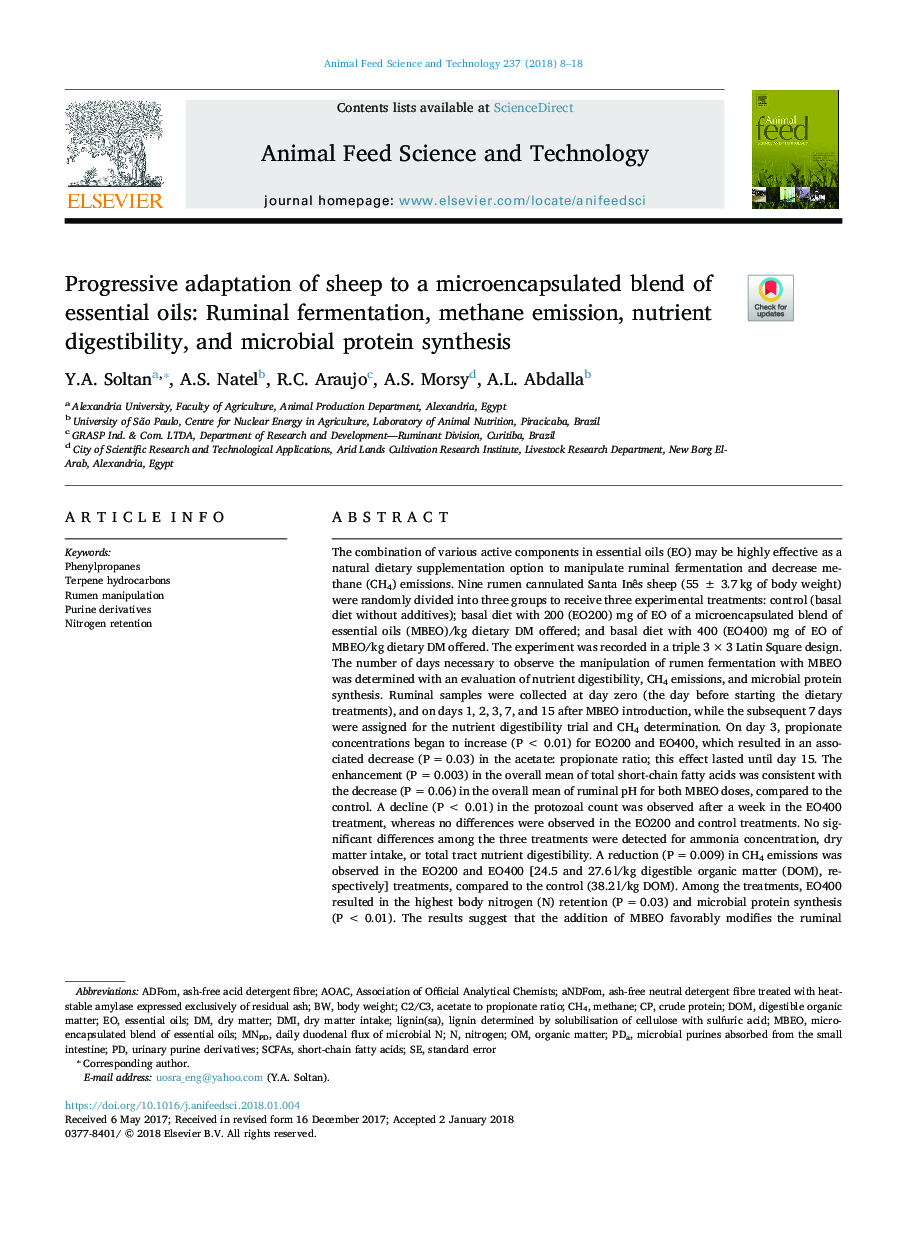| کد مقاله | کد نشریه | سال انتشار | مقاله انگلیسی | نسخه تمام متن |
|---|---|---|---|---|
| 8491009 | 1552349 | 2018 | 11 صفحه PDF | دانلود رایگان |
عنوان انگلیسی مقاله ISI
Progressive adaptation of sheep to a microencapsulated blend of essential oils: Ruminal fermentation, methane emission, nutrient digestibility, and microbial protein synthesis
ترجمه فارسی عنوان
انطباق پیشرفته گوسفند با یک ترکیب میکروکپسول شده از روغنهای ضروری: تخمیر شلغم، انتشار متان، هضم غذائی مواد مغذی و سنتز پروتئین میکروبی
دانلود مقاله + سفارش ترجمه
دانلود مقاله ISI انگلیسی
رایگان برای ایرانیان
کلمات کلیدی
aNDFomC2/C3DMISCFAsCH4PDAAOACADFomNitrogen retention - احتباس نیتروژنShort-chain fatty acids - اسیدهای چرب کوتاه مدتash-free acid detergent fibre - الیاف پاک کننده اسید اسید آزادassociation of official analytical chemists - انجمن متخصصان تحلیلی رسمیstandard error - خطای استانداردEssential oils - روغن های ضروریDOM - قضاوتLignin(sa) - لیگنین (در)organic matter - ماده آلیdigestible organic matter - ماده آلی قابل هضمdry matter - ماده خشکMethane - متان Purine derivatives - مشتقات پورینurinary purine derivatives - مشتقات پورین ادرارdry matter intake - مصرف ماده خشکacetate to propionate ratio - نسبت استات به پروپیوناتNitrogen - نیتروژنbody weight - وزن بدنcrude protein - پروتئین خام
موضوعات مرتبط
علوم زیستی و بیوفناوری
علوم کشاورزی و بیولوژیک
علوم دامی و جانورشناسی
چکیده انگلیسی
The combination of various active components in essential oils (EO) may be highly effective as a natural dietary supplementation option to manipulate ruminal fermentation and decrease methane (CH4) emissions. Nine rumen cannulated Santa Inês sheep (55â¯Â±â¯3.7â¯kg of body weight) were randomly divided into three groups to receive three experimental treatments: control (basal diet without additives); basal diet with 200 (EO200) mg of EO of a microencapsulated blend of essential oils (MBEO)/kg dietary DM offered; and basal diet with 400 (EO400) mg of EO of MBEO/kg dietary DM offered. The experiment was recorded in a triple 3â¯Ãâ¯3 Latin Square design. The number of days necessary to observe the manipulation of rumen fermentation with MBEO was determined with an evaluation of nutrient digestibility, CH4 emissions, and microbial protein synthesis. Ruminal samples were collected at day zero (the day before starting the dietary treatments), and on days 1, 2, 3, 7, and 15 after MBEO introduction, while the subsequent 7â¯days were assigned for the nutrient digestibility trial and CH4 determination. On day 3, propionate concentrations began to increase (Pâ¯<â¯0.01) for EO200 and EO400, which resulted in an associated decrease (Pâ¯=â¯0.03) in the acetate: propionate ratio; this effect lasted until day 15. The enhancement (Pâ¯=â¯0.003) in the overall mean of total short-chain fatty acids was consistent with the decrease (Pâ¯=â¯0.06) in the overall mean of ruminal pH for both MBEO doses, compared to the control. A decline (Pâ¯<â¯0.01) in the protozoal count was observed after a week in the EO400 treatment, whereas no differences were observed in the EO200 and control treatments. No significant differences among the three treatments were detected for ammonia concentration, dry matter intake, or total tract nutrient digestibility. A reduction (Pâ¯=â¯0.009) in CH4 emissions was observed in the EO200 and EO400 [24.5 and 27.6â¯l/kg digestible organic matter (DOM), respectively] treatments, compared to the control (38.2â¯l/kg DOM). Among the treatments, EO400 resulted in the highest body nitrogen (N) retention (Pâ¯=â¯0.03) and microbial protein synthesis (Pâ¯<â¯0.01). The results suggest that the addition of MBEO favorably modifies the ruminal fermentation process, and 3â¯days of treatment is necessary before a stable and modified ruminal fermentation pattern can be observed. This pattern would last for a period of two weeks.
ناشر
Database: Elsevier - ScienceDirect (ساینس دایرکت)
Journal: Animal Feed Science and Technology - Volume 237, March 2018, Pages 8-18
Journal: Animal Feed Science and Technology - Volume 237, March 2018, Pages 8-18
نویسندگان
Y.A. Soltan, A.S. Natel, R.C. Araujo, A.S. Morsy, A.L. Abdalla,
